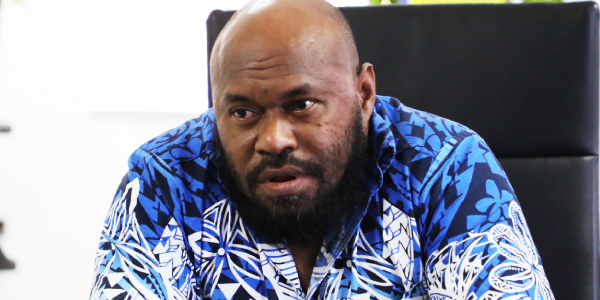
Massiel Lugo, a single mother from Elmhurst, spent years trying to draw attention to the open-air street prostitution in the Roosevelt Avenue area of Queens. In recent months, she said, she’s seen a sharp reduction in the amount of sex workers along the corridor, and credits Operation Restore Roosevelt, a 90-day enforcement effort launched by Mayor Eric Adams in the fall targeting prostitution, illegal vending and other quality-of-life concerns. “My community is now safer and clean,” said Lugo, who teaches at a public school in Corona.
“I hope the cleanup continues.” Lugo is getting her wish. City officials announced earlier this week that the enforcement effort, originally due to end in January, will continue indefinitely.

”We are totally committed to staying past the 90 days,” NYPD Deputy Commissioner Kaz Daughtry said at a town hall Wednesday in Corona, hosted by Adams. “We're working on another plan and what Phase 2 is going to look like at Roosevelt Avenue. We're going to make it a lot better than what it is now.
” Daughtry said crime in the Roosevelt Avenue corridor was down 21% in January, year over year, crediting the enhanced police presence. The operation resulted in 985 arrests, including 134 for prostitution-related offenses, and 11,500 summonses, according to the city. It also resulted in 292 building inspections, ending in 18 orders to vacate, as well as 522 vendor inspections, resulting in the confiscation of 94 propane tanks.
“We made a commitment,” Daughtry said. “Promises made, promises kept on Roosevelt Avenue. We're not taking the resources away from there.
” Shekar Krishnan, a council member representing the area, said in a statement that collaboration between local elected officials and city and state agencies has “led to real change,” including the shuttering of illegal smoke shops and massage parlors. He also pointed to increased sanitation pickups and more lighting for the “dark corners of the avenue.” And some neighborhood residents and business owners, who have long complained about sex workers openly soliciting on Roosevelt Avenue, have applauded the crackdown, saying it was long overdue.
But the initiative has drawn criticism from immigrant rights groups and sex workers who complain of over-policing and police profiling. The NYPD did not respond to a request for comment. Carina Kaufman-Gutierrez, the deputy director of the Street Vendor Project, said the crackdown on unlicensed vendors had hurt workers just trying to earn a living.
“ It has been devastating,” she said. “It has been devastating financially, mentally, emotionally. We are seeing families at risk of eviction.
” Jessica Ramos, a state senator who represents part of the area, said, “ Operation Restore Roosevelt Avenue did not restore anything, but the fear that many of my undocumented neighbors felt during the first Trump administration.” Still, other area residents said they were encouraged by the changes. Shagor Chowdhury, a Jackson Heights resident who earlier said it had become a “common occasion” to encounter people having sex in cars on side streets, said he’s now seeing “some positive developments.
” “We've noticed an increase in police patrols and a decrease in open solicitations,” Chowdhury said. “Around 74th and 75th streets, things are much better.” Lugo, who was raised in Jackson Heights, said she organized a protest against the open-air sex work in 2022, testified at City Hall in support of legislation requiring hotels and massage parlors to obtain licenses and took up the issue with Adams at community meetings.
Nonetheless, she said, it was difficult to get elected officials to take her seriously, adding she no longer felt safe taking walks in the neighborhood. She said her 15-year-old daughter regularly endured “catcalling” from men on the way to school. Men "were coming from different areas to receive ‘services’ from the prostitutes,” Lugo said.
“There were drunk men on every corner and even people with needles.” The city rolled out its enforcement effort in October, involving stepped-up police patrols as well as action from other city agencies, including the Fire Department, Department of Buildings, Department of Health and Mental Hygiene, Mayor’s Office to End Domestic and Gender-Based Violence and the New York City Sheriff’s Office. “Things are looking much better now,” Lugo said.
“I haven’t seen prostitutes in my area in a few months now.” At Wednesday’s town hall, Lugo credited City Council member Francisco Moya, saying other elected officials had ignored her appeals. Moya, in turn, thanked Adams for taking on the issue and delivering results.
“Parents were saying we don't have to take our kids to school and see the open air prostitution that was going on over there,” Moya said. “People are seeing cleaner streets. They're seeing real changes.
” Adams added, “ I saw what used to be brothels closed down and turned into stores and shops. That's what communities deserve.” But for at least one business owner, the changes have been a mixed blessing.
Tsomo Dasel, the owner of Himalayan Yak restaurant on Roosevelt Avenue, said she and her employees had been plagued by the presence of an illegal massage parlor on the same block. The establishment has since been shuttered – the Department of Buildings affixed a “Do Not Enter” sign at the entrance. But Dasel said she worries about the increased contacts between police and local residents.
“There is no simple answer,” Dasel said..











